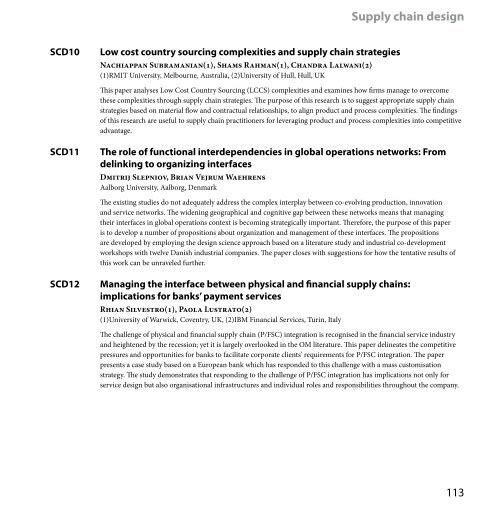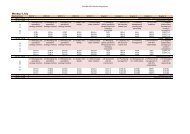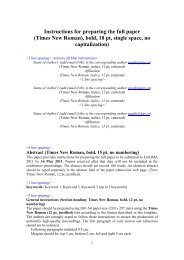Download the book of abstracts - EurOMA 2011
Download the book of abstracts - EurOMA 2011
Download the book of abstracts - EurOMA 2011
You also want an ePaper? Increase the reach of your titles
YUMPU automatically turns print PDFs into web optimized ePapers that Google loves.
SCD10 Low cost country sourcing complexities and supply chain strategies<br />
Nachiappan Subramanian(1), Shams Rahman(1), Chandra Lalwani(2)<br />
(1)RMIT University, Melbourne, Australia, (2)University <strong>of</strong> Hull, Hull, UK<br />
Supply chain design<br />
This paper analyses Low Cost Country Sourcing (LCCS) complexities and examines how firms manage to overcome<br />
<strong>the</strong>se complexities through supply chain strategies. The purpose <strong>of</strong> this research is to suggest appropriate supply chain<br />
strategies based on material flow and contractual relationships, to align product and process complexities. The findings<br />
<strong>of</strong> this research are useful to supply chain practitioners for leveraging product and process complexities into competitive<br />
advantage.<br />
SCD11 The role <strong>of</strong> functional interdependencies in global operations networks: From<br />
delinking to organizing interfaces<br />
Dmitrij Slepniov, Brian Vejrum Waehrens<br />
Aalborg University, Aalborg, Denmark<br />
The existing studies do not adequately address <strong>the</strong> complex interplay between co-evolving production, innovation<br />
and service networks. The widening geographical and cognitive gap between <strong>the</strong>se networks means that managing<br />
<strong>the</strong>ir interfaces in global operations context is becoming strategically important. Therefore, <strong>the</strong> purpose <strong>of</strong> this paper<br />
is to develop a number <strong>of</strong> propositions about organization and management <strong>of</strong> <strong>the</strong>se interfaces. The propositions<br />
are developed by employing <strong>the</strong> design science approach based on a literature study and industrial co-development<br />
workshops with twelve Danish industrial companies. The paper closes with suggestions for how <strong>the</strong> tentative results <strong>of</strong><br />
this work can be unraveled fur<strong>the</strong>r.<br />
SCD12 Managing <strong>the</strong> interface between physical and financial supply chains:<br />
implications for banks’ payment services<br />
Rhian Silvestro(1), Paola Lustrato(2)<br />
(1)University <strong>of</strong> Warwick, Coventry, UK, (2)IBM Financial Services, Turin, Italy<br />
The challenge <strong>of</strong> physical and financial supply chain (P/FSC) integration is recognised in <strong>the</strong> financial service industry<br />
and heightened by <strong>the</strong> recession; yet it is largely overlooked in <strong>the</strong> OM literature. This paper delineates <strong>the</strong> competitive<br />
pressures and opportunities for banks to facilitate corporate clients’ requirements for P/FSC integration. The paper<br />
presents a case study based on a European bank which has responded to this challenge with a mass customisation<br />
strategy. The study demonstrates that responding to <strong>the</strong> challenge <strong>of</strong> P/FSC integration has implications not only for<br />
service design but also organisational infrastructures and individual roles and responsibilities throughout <strong>the</strong> company.<br />
113





